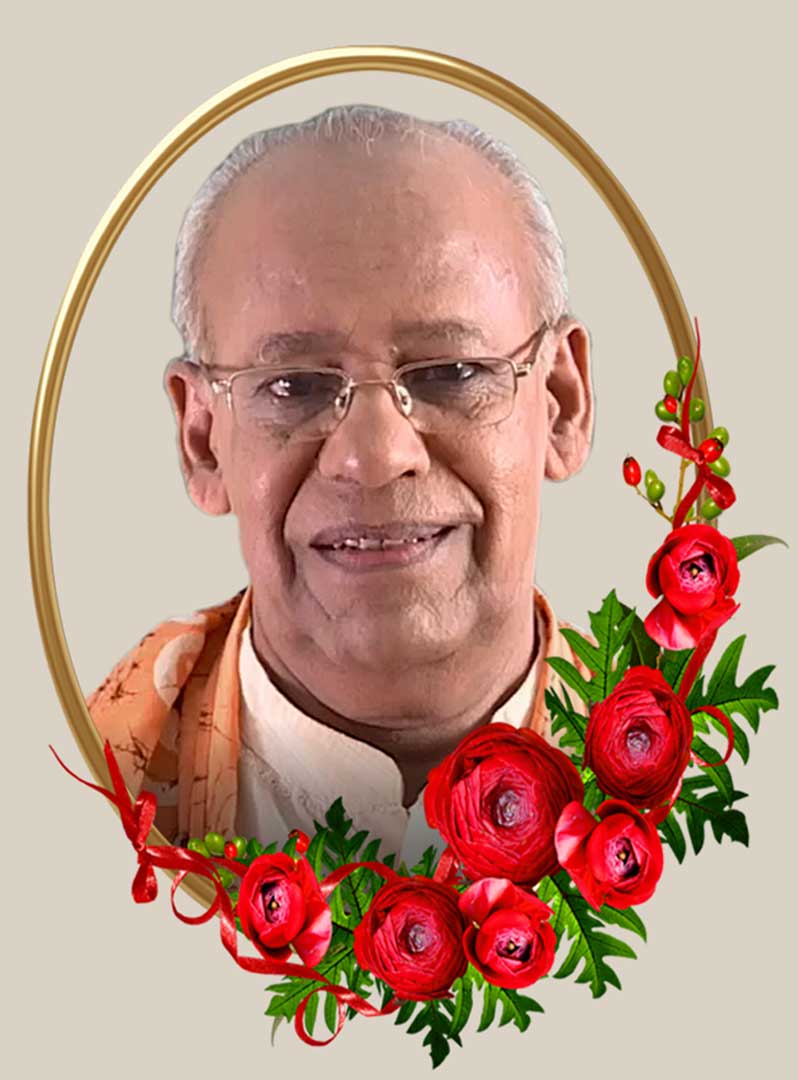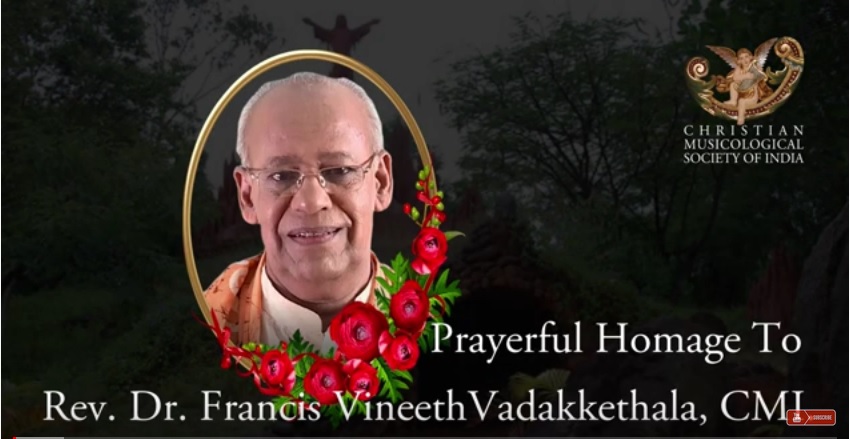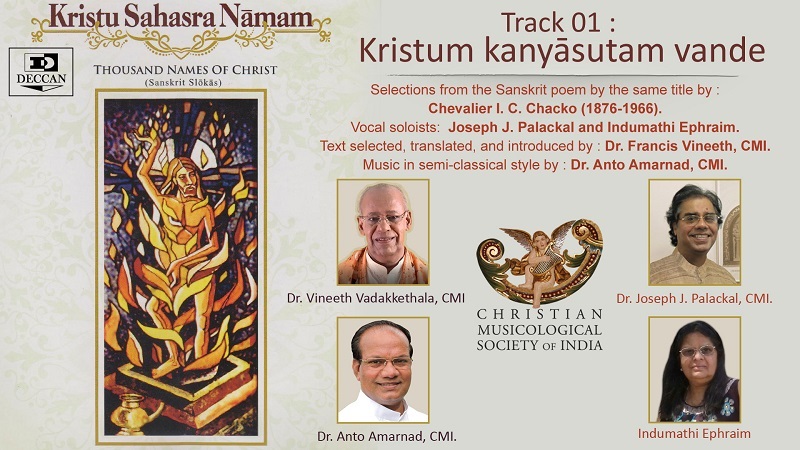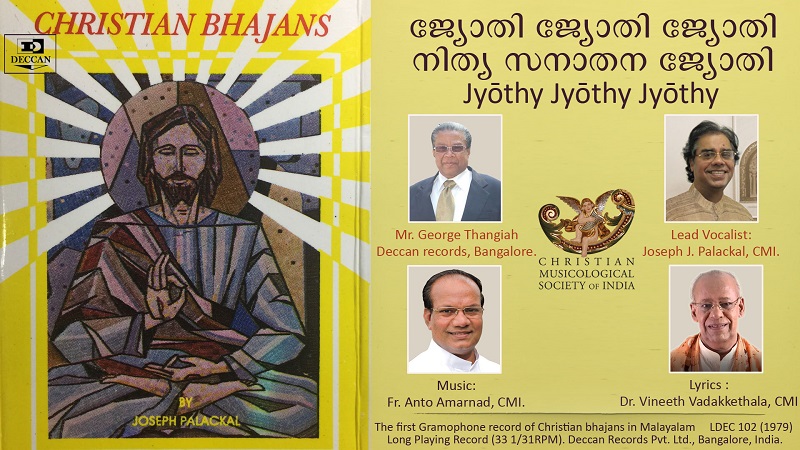Dr. Francis Vineeth, CMI

Professor of Indian philosophy, an intellectual leader who tried to build bridges between India and Christianity, founder of Vidyavanam Ashram in Bengaluru, lyricist
(1935-2021)
Prayerful Homage to Dr. Francis Vineeth Vadakkethala, CMI
Dr. Francis Vadakkethala, CMI. Was an intellectual gaint who chose the name ‘Vineeth’, which in Sanskrit means humble!. The name defined his self understanding and his public persona. Fr. Vineeth drew inspiration, equally from the Bible and the Bhagawat Gita. He had an unusual intellectual acumen to explain semitic thoughts in Sanskrit terms. The best example is the lyrics he wrote for the LP Record- Christian Bhajans - “ Jyothi Jyothi Jyothi’. The lyrics is the simple exegesis of the prologue in St. John’s Gospel. Toward the latter part of his academic life, Dr. Vineeth broke away from the status quo and started an Ashram Movement at Vidyavanam Ashram, in the outskirts of Bangaluru. Fr. Vineeth was comfortable with bridging India and Christianity. Chev. I.C. Chacko’s Kristu Sahasra Namam was his favourite poem. Fr. Vineeth appreciated Chacko’s Poetic genius to compress layers of ideas in a few Sanskrit slokas. It was Fr. Vineeth’s interest that led to the commercial release of ‘Kristu Sahasra Namam’ in the musical setting of his student Dr. Anto Amarnad, CMI. , in 1985 and a re-release of the same in the cd format in 2014. - By Dr. Joseph J. Palackal CMI
Note on Kristum kanyāsutam vande By Joseph J. Palackal CMI
Note on Jyothi Jyothi by Joseph J. Palackal CMI
This chant is a tribute to the remarkable talent of Dr. Francis Vineeth, CMI, who combined poetry with theology. The text is based on the prologue to the fourth gospel. For that reason, this bhajan text may have a special place in the history of Christian music in India. Dr. Anto Amarnad, CMI, a young seminarian at Dharmaram College, composed a catchy melody in the popular ¾ rhythm. The song text blended smoothly into that rhythmic frame and joyful, singable melody. Thus, Joyothi Jyothi, became the most popular track in the Long Play record. Most of the words in the text were familiar to Hindi speakers and other Sanskrit-based languages in India. Dr. Vineth and Dr. Amarnad made profound theology intimate to an Indian audience. Many Catholic schools used the bhajan for prayer dance for public functions. These factors led to the popularity of the LP record, which became a commercial success to the surprise of many.
Mr. George Thangiah, the Managing Director of Deccan Records, took a risk in producing a Bhajan record, the first of its kind in Malayalam. There was no precedence and no guarantee that the Keralites would welcome an LP record of semi-classical music. Contrary to all expectations, the LP became popular in Kerala, too. Mr. Thangiah traveled to Kerala and attended the releasing function at Town Hall in Ernakulam. The commercial success of the LP prompted Mr. Thangiah to produce another unique work in Sanskrit, Kristu Sahasra Namam, a few years later. Both these releases put Deccan Records into the history of Christian music in India. We are grateful to Deccan Records for transferring the copyright of the tracks to the Christian Musicological Society of India in 2006.
CMSI-255 Jyothi Jyothi - ജ്യോതി ജ്യോതി - famous BHAJAN. Deccan Records. 1979
Joseph J. Palackal, CMI
New York
12 April 2021
A deep longing welled up in heart as I pondered over the amazing work of Chevalier I.C.Chacko, the Kristu-sahasra-nāmam. And it became my cherished dream to bring it to the devotional life of Indian Christians. A thousand names of Christ! Just a thousand epithets and thousand titles in exquisite biblical lore, and enticing poetical charm and what more, all presented in classical Sanskrit lyrics. Who would not be tempted to have a try? It enshrines the whole history of Christ, gathered from the New and Old Testaments alike, all in one hymn of adoration, a long litany of praise. You can pray fully recite it then, unawares, in accompanying rhythm; you are transported to the marvelous setting of the Gospels, Psalms and the Book of Revelation. This is I. C. Chacko’s Kristu-sahasra-nāmam, a Christian counterpart of the well know Hindu Vishnu-sahasra-nāmam.
Almost seventy years ago, when the enculturation movement was rather at low ebb, I.C Chacko, a learned layman of the ancient St. Thomas Christian Church of Kerala, came forward with the challenging concept of a Kristu-sahasra-nāmam. As Brahmabandhav Upadhyay (1861-1907) was not fortunate enough to hear his famous hymn Vande Saccidānandam in the Christian churches of his time, so too I.C. Chacko was not rewarded by an immediate recognition of this Christian masterpiece as a prayer book of the church. Yet, I.C. an honoured lay scholar of the church, a prolific author of creative works, and, and according to the then accepted style of honouring, Chevalier of the church. Though an engineer by vocation, with creditable degree from England, I.C. was an acknowledged Sanskit Scholar, a specialist in linguistics and, above all, a bold thinker in the Church of his time. Of the many other books of I.C., the one which deserves special mention is his famous Pāninīya Pradhyōdam which secured the national award for displaying high scholarship in Sanskrit and linguistics.
I am truly happy to present I.C.’s Kristu-sahasra-nāmam to a wider Christian world today, and really feel proud that the work has come from an unmatched Sanskrit Scholar who lived his Christian faith in word and deed. I found in the person of Anto Amarnad, a composer who can feel, relish and reverberate I.C.’s thinking in the right musical rhythm. When the gifted artists, Fr. Joseph Palackal and Indumathi Ephrem lent their melodious voices to these Christological lyrics and musical notes of Fr. Anto Amarnad, the result was the much loved and eagerly awaited recording: Kristu-sahasra-nāmam. I gladly present all these young artists to the lovers of our Church and culture, rhyme and rhythm, with a blend of new ideas.
In the original Sanskrot verses, all the thousand names are presented in the accusative case as the objects of verbs Vande, Bhaje, or Pranamāmi, all of which ate transitive verbs, meaning ,”I revere and I adore.”. However in English translation for better understanding, I have presented many of the names as simple qualifications of Jesus, all of them ultimately referring to Christ whom the devotees adore. Though the poetic Rhyme and Rhythm are given due attention, the prime consideration was always fidelity to the original.
This recording does not t present all the thousand names of Christ, but only a selection of the best among them, arranged under eight separate titles. Appropriate tunes are successfully provided by Amarnad to match the moods and content of the selected texts. In the fond hope that one day these verses will find their way into the prayer life of many a devoted Christian, religious as well as lay, I present to the lyrical world this musical feat which is a happy blend of the classical rhythm of our country (India) and sacred music of our Church. And all Churches are parts or limbs of one universal Church, the mystical body of Christ,
Francis Vineeth C.M.I.Dharmaram College
Jan 1, 1985

 Homage to a Guru- Dr. Francis Vineeth
Homage to a Guru- Dr. Francis Vineeth  Song - Kristum kanyāsutam vande (क्रिस्तुं कन्या सुतं वन्दे) - Kristusahasranamam | Lyrics - Dr. Francis Vineeth CMI | Music - Anto Amarnad CMI
Song - Kristum kanyāsutam vande (क्रिस्तुं कन्या सुतं वन्दे) - Kristusahasranamam | Lyrics - Dr. Francis Vineeth CMI | Music - Anto Amarnad CMI
 Song - Jyothi Jyothi (ജ്യോതി ജ്യോതി) - Christian Bhajans | Lyrics - Dr. Francis Vineeth | Music - Anto Amarnad CMI
Song - Jyothi Jyothi (ജ്യോതി ജ്യോതി) - Christian Bhajans | Lyrics - Dr. Francis Vineeth | Music - Anto Amarnad CMI
